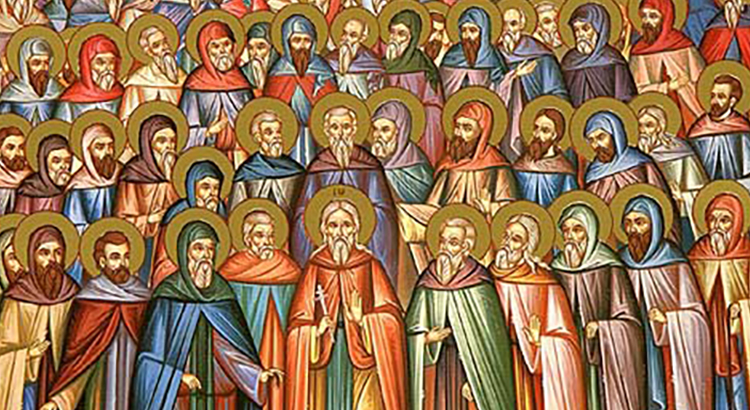Memory of the Saints and the Prophets
Reading of the Word of God
Alleluia, alleluia, alleluia
You are a chosen race,
a royal priesthood, a holy nation,
a people acquired by God
to proclaim his marvellous works.
Alleluia, alleluia, alleluia
Luke 13,22-30
Through towns and villages he went teaching, making his way to Jerusalem. Someone said to him, 'Sir, will there be only a few saved?' He said to them, 'Try your hardest to enter by the narrow door, because, I tell you, many will try to enter and will not succeed. 'Once the master of the house has got up and locked the door, you may find yourself standing outside knocking on the door, saying, "Lord, open to us," but he will answer, "I do not know where you come from." Then you will start saying, "We once ate and drank in your company; you taught in our streets," but he will reply, "I do not know where you come from; away from me, all evil doers!" 'Then there will be weeping and grinding of teeth, when you see Abraham and Isaac and Jacob and all the prophets in the kingdom of God, and yourselves thrown out. And people from east and west, from north and south, will come and sit down at the feast in the kingdom of God. 'Look, there are those now last who will be first, and those now first who will be last.'
Alleluia, alleluia, alleluia
You will be holy,
because I am holy, thus says the Lord.
Alleluia, alleluia, alleluia
Top of Form
Jesus walks among people looking at whom he meets, listening to those who call him, consoling, healing. Exhorting and proclaiming the imminence of the kingdom of God. Jesus' goal is Jerusalem. In such horizon the question about the number of the saved becomes relevant. It was clear that in this way the salvation for the entire people of Israel was questioned. In an apocryphal Jewish text, for example, we can read: "The Almighty has done this century for many, the future instead for a few" (fourth book of Ezra). Jesus opens a different perspective: we do not enter into the kingdom of God merely belonging to the people of Israel, or a nation or an ethnic group or culture, and so on. It is faith that saves. And salvation is for those who chose to adhere to the Kingdom of God. It is on this choice that there will be judgment. And on that day ethnic or religious belonging will be of no use. The criterion of salvation will be the choice for the Gospel of love. Indeed - Jesus adds, " 29Then people will come from east and west, from north and south, and will eat in the kingdom of God." What matters is to choose immediately to follow the Lord, before it is too late. This is the meaning of the image of the narrow door: in front of the preaching of the Gospel, we cannot postpone listening to it, we cannot extend the time for choice. If the Gospel is rejected, it is like reaching the house mentioned in the Gospel passage when the master has already closed the door. Those who remain outside, who do not listen, will remain at the mercy of the prince of evil and will feel the bite of the cold of sadness and the bitterness of loneliness. Jesus' statement about those "last" who will be first - the text refers to the Gentiles - emphasizes the "primacy" of listening: those who accept the Gospel in their heart and put it into practice become the first in the kingdom of heaven.
